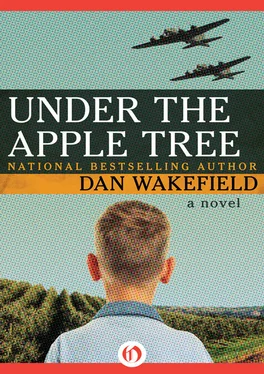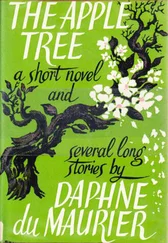Artie closed his eyes but he couldn’t sleep. He wondered where Roy was and what he was doing, wondered if he and his buddies had driven right on to Washington, D.C., to march right up the White House steps bright and early in the morning and offer their amazing athletic skills as Birney Bearcats to President Roosevelt himself to help fight the Japs. Maybe Bubbles LaMode had gone with them, to volunteer as an entertainer who would boost the morale of the troops.
Artie said his prayer, asking God to bless America, and forgive him and Roy for pulling the wool over their parents’ eyes by fibbing about the Phantom Caveman. Artie couldn’t help wondering if maybe he’d gone to Sunday School that morning and come right home to do his school-work, the Japs might not have bombed Pearl. Harbor and the War wouldn’t even have started! But then he realized that was crazy. As sneaky as the Japs were, they couldn’t have found out that he and his brother had violated the Sabbath in Birney, Illinois, and even if they knew, they wouldn’t have cared. Nothing was sacred to the Japs, not even God or America. Artie squeezed his eyes shut, knowing he’d need his sleep to be strong for the trying times ahead.
A black armored tank with the sign of the Rising Sun on the side roared down Sycamore Street, pulling right into the Garbers’ driveway with a sudden throb of the engine, then stopped. A shot rang out.…
“… have to slam the door?”
Artie woke to his father’s voice, which did not sound at all philosophical.
“All present, ’counted for!” came Roy’s voice, wild and slurry.
“Shhh! Your brother’s asleep!” hissed Mom.
Artie threw back the covers, set his feet on the cold floor, and got down on hands and knees. He moved stealthily to the bedroom door, reached up and opened it, then crawled out along the hall to the head of the stairs. From between the posts that held up the banister, he could peer down into the living room, but from where he crouched, all he could see were legs and feet.
Mom and Dad’s legs were stiff; Roy’s were wobbly.
“Where have you been—or can you remember?” Dad asked in a cold, even tone.
Roy’s feet made little shuffling moves, like he was trying to keep his balance. His voice came out in a cracking singsong:
A bunch of the boys were whoopin’ it up
In the Malemute Saloon …
“That’s enough,” Dad said.
His feet took a step closer to Roy’s.
Roy’s feet shuffled back, then planted themselves apart, defiant, “Went for a little spin is all,” he said sullenly.
Mom’s right foot began to tap.
“No more car,” she said, “not till you graduate.”
Roy made a croaking kind of laugh.
“School’s out!” he said. “War’s on!”
“You straighten up and speak like you should to your mother,” Dad said.
Sassing Mom was one thing Dad was not ever philosophical about.
Roy’s legs stiffened and he clicked his heels together.
“Atten- hut !” Roy called out like a Drill Sergeant.
Dad took a step nearer to him.
“Get smart with me and I’ll clean your clock,” Dad said, “and don’t think I can’t still do it.”
Mom’s feet moved quickly between Roy’s and Dad’s.
“‘If you can keep your head when all about you,’” she recited, “‘Are losing theirs and blaming it on you …’”
Roy hiccuped, and said in a slurry voice, “‘What’s more, you’ll be a man, my son—’”
His legs suddenly wobbled, and his body slumped over them.
Hands reached down.
“Let’s get him to bed,” Dad said.
“Gently now, Joe. Gently.”
Artie swiveled on his knees and made for his room.
Grunts, falls, muffled moans, stumbling on the stairs, sounded through the pillow that Artie pulled over his head as the body of the fallen hero of last night’s victory (it now seemed long ago, in another season) was hauled to its bed. Artie knew if Roy went to War he would be a real hero on the battlefield, just as he had been on the gridiron and the basketball floor of Birney, but heroes in War could get wounded or even killed, and the other side of glory was not just defeat but death. Artie tried not to think about it, but his mind went out to those imagined far edges of the world where the soldiers and refugees ran and fell and this time the flames were brighter and closer; now he understood they were not just the backdrop to War, the bright decoration of battle.
They were real.
Everyone from first grade right up through high school assembled in the auditorium to hear F.D.R. on the radio. Over the urgently crackling airwaves that famous voice, with its top-dog, Eastern accent, told the boys and girls, the teachers and coaches of Birney, the way things were, in no uncertain terms.
“Yesterday, December 7, 1941—a date which will live in infamy—the United States of America was suddenly and deliberately attacked by naval and air forces of the Empire of Japan …”
Artie got goose bumps, thinking of a whole Empire attacking his country; beside him, Ben Vickman made a hissing sound.
“I ask the Congress declare that since the unprovoked and dastardly attack …”
That was a good word for the Japs— dastards .
“… a state of war has existed …”.
It was official now. The President had said it.
War.
Mr. Goodleaf, the Principal, stood up in the center of the stage when the speech was over. As befitted the occasion, he was wearing his uniform—the black and gold outfit with epaulets and braid that denoted his position as Director of the Band. Everyone stood as he led them in singing “The Star-Spangled Banner,” “America the Beautiful,” and the Birney Bearcat Fight Song.
Artie looked around the big room as he sang at the top of his lungs, and felt proud. His brother and the other big athletes stood against the wall, wearing their sweaters and corduroys, some with their hands on their hips or stuck in their back pockets, loose and ready for anything, players and winners who were ready and willing to fight for their home, their school, their country. No Empire of dastards could ever defeat them.
The four varsity cheerleaders bounced onstage in their streetclothes and led the Victory yell:
Fight em, team, fight em;
Beat em, team, beat em;
Beat em fair, beat em square;
Beat em, team, beat em!
Shirley Colby, as always, bounced higher than the rest, her dark hair flying, her taut calves, sheathed in nylon, shimmering.
Artie looked over at his brother looking at Shirley, and after the din of the cheer subsided, Roy doubled his fist and led the jocks in the unofficial, favorite, “Cemetery” cheer:
Hit em in the teeth,
Kick em in the jaw,
Cemetery, Cemetery,
Rah rah rah!
The auditorium roared.
Mr. Goodleaf got up again and called for order. He said now everyone should return to classes, and study as hard as they could to help win the War. He said there would be basketball practice in the gym and band rehearsal in the auditorium after school as usual. Then he said he wanted to see Roy Garber in his office.
There were hoots and whistles as everyone turned to look at Roy, who grinned and clasped his hands over his head like a champ.
“Your brother’s in for it now,” Ben Vickman said ominously.
“Like fun,” said Artie.
He didn’t believe Mr. Goodleaf had it in for Roy just because he led the “Cemetery” yell; that was the least the Japs deserved. What worried him was that Mr. Goodleaf had somehow found out about Roy and the guys going over to Moline to see Bubbles LaMode on the day the Japs attacked Pearl Harbor, but there wasn’t anything unpatriotic about it since they didn’t know it was going to happen. Maybe he found out they got drunk, though, which was breaking training, but why would he only call Roy when Wings and Bo were along too? Maybe Roy was the only one who got drunk, but even if that was true, his own buddies wouldn’t have ratted on him. Maybe it wasn’t anything bad at all, but just the opposite, like Roy being picked for some secret mission in the War because he was such a terrific athlete.
Читать дальше












